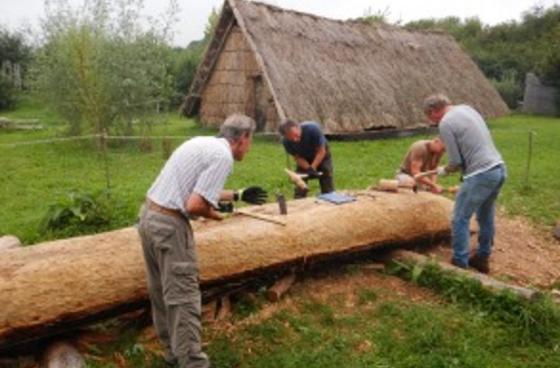Public participation in archaeological projects is becoming ever more essential and experimental archaeology is an excellent way of reaching out: doing things together and exploring the various technological choices of the past creates a scientific community in which both scientists and the general public can benefit. This approach has been fundamental to the reconstruction of a house plan from the Neolithic Vlaardingen culture in the Vlaardingen-Broekpolder. This reconstruction forms part of the open-air educational center of Masamuda (www.masamuda.nl). The Vlaardingen culture refers to Neolithic sites which are for the most part located in the Rhine/Meuse delta. The sites are characterized by a diversity in location, subsistence base and material culture.
Having constructed the Vlaardingencultuurhuis, how should we subsequently “bring this house to life”? What did people actually do in and around these houses, which crafts did they carry out, how did they obtain and process their food and which toolkits were involved in these daily activities? How did they move around the landscape to collect resources?
Although we know much about the plants used and the animals consumed during the Vlaardingen period, we know surprisingly little about the role of material culture and the activities tools and objects involved. In this project, we will use a combination of experimental archaeology and detailed material studies like use-wear analysis to enrich our knowledge about daily life in the Vlaardingen period. Detecting use-wear traces from different activities enables us to also obtain some insights into “hidden” crafts that rarely leave archaeological traces such as basketry, hide working or other crafts involving organic, perishable materials. In the field lab, students will also be studying archaeological materials from the Vlaardingen culture, comparing them with the experimental tools they use.
The focus of the project, and thus, of the field school is exactly such crafts involving organic materials. We will carry out a series of experiments, under the guidance of experienced craftspeople, to explore the affordances of different materials, as well as the tools and techniques that were likely used. These experiments are conducted together with the local volunteers of Masamuda and will take place at the center. Students will share their experiments and the research questions of the project with the general public who regularly visit the Vlaardingencultuurhuis. Dialogue with the public is considered an essential research tool in the project and for this reason, EXARC (www.exarc.net) is a partner of the project, managing our social media outreach. EXARC distributes blogs, visualizations and videos of our project to their many followers via their own social media. Students will be contributing to this by writing blogs and making short videos.
Course Details
-
Course Dates: July 9 – 27, 2022
-
Enrollment Status: Open
-
Total Cost: $3,620
-
Course Type: Experimental archaeology, community/public archaeology
-
Instructors: Dr. Annelou van Gijn
-
Payment Deadline: April 15, 2022
-
Orientation: TBA
-
Academic Credit Units: 4 Semester Credit Units (Equivalent to 6 Quarter Units)

